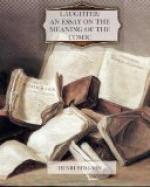Why do we laugh at a head of hair which has changed from dark to blond? What is there comic about a rubicund nose? And why does one laugh at a negro? The question would appear to be an embarrassing one, for it has been asked by successive psychologists such as Hecker, Kraepelin and Lipps, and all have given different replies. And yet I rather fancy the correct answer was suggested to me one day in the street by an ordinary cabby, who applied the expression “unwashed” to the negro fare he was driving. Unwashed! Does not this mean that a black face, in our imagination, is one daubed over with ink or soot? If so, then a red nose can only be one which has received a coating of vermilion. And so we see that the notion of disguise has passed on something of its comic quality to instances in which there is actually no disguise, though there might be.
In the former set of examples, although his usual dress was distinct from the individual, it appeared in our mind to form one with him, because we had become accustomed to the sight. In the latter, although the black or red colour is indeed inherent in the skin, we look upon it as artificially laid on, because it surprises us.
But here we meet with a fresh crop of difficulties in the theory of the comic. Such a proposition as the following: “My usual dress forms part of my body” is absurd in the eyes of reason. Yet imagination looks upon it as true. “A red nose is a painted nose,” “A negro is a white man in disguise,” are also absurd to the reason which rationalises; but they are gospel truths to pure imagination. So there is a logic of the imagination which is not the logic of reason, one which at times is even opposed to the latter,—with which, however, philosophy must reckon, not only in the study of the comic, but in every other investigation of the same kind. It is something like the logic of dreams, though of dreams that have not been left to the whim of individual fancy, being the dreams dreamt by the whole of society. In order to reconstruct this hidden logic, a special kind of effort is needed, by which the outer crust of carefully stratified judgments and firmly established ideas will be lifted, and we shall behold in the depths of our mind, like a sheet of subterranean water, the flow of an unbroken stream of images which pass from one into another. This interpenetration of images does not come about by chance. It obeys laws, or rather habits, which hold the same relation to imagination that logic does to thought.
Let us then follow this logic of the imagination in the special case in hand. A man in disguise is comic. A man we regard as disguised is also comic. So, by analogy, any disguise is seen to become comic, not only that of a man, but that of society also, and even the disguise of nature.




